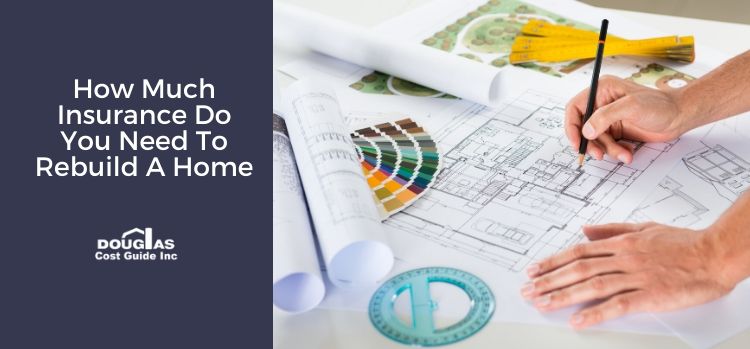There is not a standard amount of insurance coverage you need to ensure you’re able to rebuild your home. Each home is as unique as the individuals that dwell within it. The most important component to any homeowner’s policy is its replacement cost. The replacement cost coverage is the amount of money it would cost your insurance company to rebuild your home, from the ground up, in the event of a total loss. It’s important to note, replacement cost is not the same as market value and varies greatly from home to home. Depending on your geographic location, and the current market conditions, you may be shocked to find that the replacement cost of your home is either drastically less, or significantly more than the price you paid for it.
Replacement Cost Factors to Rebuild a Home
Replacement cost considers many, many factors: size, shape and age of the home are the most significant. Finishes and style of the home are also important: what types of flooring and countertops are used, is the foundation block or concrete, how many bedrooms, bathrooms, what is the size of each room, how many windows, doors, etc., are there any specialty features: mill-work, built-in units or custom work? All these details are imperative to ensuring your home’s replacement cost is calculated accurately.
Your Home Replacement Cost and Your Insurance Policy
After all the details of your home are recorded, specialty replacement cost systems, such as the Douglas Residential Cost Guide, calculate the replacement cost based on the materials used, labour required and even geographic location. Labour/man hours to build a home in Toronto will be more costly than labour in a small rural Ontario community. Replacement cost tools also factor in market values and prices; as such, inflation is taken into consideration. Most insurance policies increase the home replacement cost on policies by a certain percentage every few years to account for inflation; that being said, it’s important to re-evaluate your home replacement cost every few years to ensure the value remains relevant.
It’s also important to speak with your insurance company when completing home renovations, improvements or upgrades. Anything that will add value to your home will need to be captured in your home’s replacement cost; thus, a recalculation will be required.
Ensuring You Have Adequate Coverage in The Event of a Total or Partial Loss
Now that we’ve outlined the specifics of replacement cost to rebuild your home, the question still remains: How much insurance do you need to rebuild a home?
By calculating your home’s replacement cost, either with your insurance company, or utilizing a third-party calculator, such as the Douglas Residential Cost Guide, you can breathe a little easier knowing there are professional tools designed to ensure your home is covered accurately; however, it can still be a little daunting to put your faith into one system. It’s advisable to utilize a third-party valuation tool, in addition to your insurance company’s replacement cost tool, to compare the values and give you a better understanding of your home’s replacement value.
If you’re still uneasy and want extra assurance that your home will be covered in the event of a loss you can speak with your agent or broker about guaranteed replacement cost coverage. Most homeowner’s policies are replacement cost policies, meaning your insurance company agrees to rebuild your home, or repair any damage incurred, up to the amount of your policy’s listed replacement cost. However, replacement caps out once the stated replacement cost has been reached.
A Guaranteed Replacement Policy
A guaranteed replacement cost policy states that your insurance company will repair or replace your home to put you in the same position you were in prior to the loss, even if the cost is over and above your policy’s stated replacement cost. Of course, there are stipulations: you cannot simply use the opportunity to rebuild your home with upgraded features, or add additional square-footage, etc. and think there will be coverage in place for these improvements due to your guaranteed replacement policy.
A guaranteed replacement policy states that your insurance company will put you back in the same position you were in prior to the loss. This means, the same finishes and square footage, not improvements. Coverage will cap out if a homeowner decides to implement improvements during the rebuild process. It’s also worth noting that some companies limit their guaranteed replacement cost policies to 110% of the replacement cost value. In some cases, with some companies, homes built prior to a specific year may not be eligible for a guaranteed replacement cost policy. It’s important to discuss your home’s replacement cost and your policy options with your agent or broker to understand what coverage options are not only available for you but are best for your home and your family.
Armed with your home’s calculated replacement cost and the proper knowledge of the various coverage options, you can take comfort in knowing that your home and your family are properly protected. Consult the Douglas Residential Cost Guide to properly estimate the replacement cost of your home.

